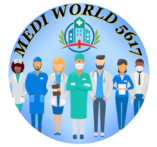CAREER IN PHARMACY

A career in pharmacy is a dynamic and fulfilling choice, offering opportunities in healthcare, research, education, and industry. Pharmacists play a vital role in patient care, medication management, and pharmaceutical innovation. Here’s an in-depth guide to pursuing a career in pharmacy:
Why Choose Pharmacy as a Career?
Diverse Career Opportunities:
- Work in healthcare, industry, education, or regulatory bodies.
- Options to specialize in areas like oncology, pediatrics, or research.
Job Stability and Demand:
- Rising healthcare needs ensure consistent demand for pharmacists.
- Opportunities in both urban and rural settings.
Impactful Role:
- Directly contribute to improving patients’ health and well-being.
- Innovate in drug development and healthcare policies.
Educational Pathways
Diploma in Pharmacy (D.Pharm):
- Duration: 2 years.
- Suitable for entry-level roles in community pharmacies.
Bachelor of Pharmacy (B.Pharm):
- Duration: 4 years.
- Prepares for careers in clinical practice, industry, and academia.
Doctor of Pharmacy (Pharm.D):
- Duration: 6 years (5 years + 1-year internship).
- Focuses on clinical and hospital pharmacy.
Master of Pharmacy (M.Pharm):
- Duration: 2 years after B.Pharm.
- Offers specialization in fields like pharmacology, pharmaceutics, or quality assurance.
Ph.D. in Pharmacy:
- For those aiming for advanced research or academic roles.
Career Options in Pharmacy
1. Clinical Pharmacy
- Work in hospitals and healthcare centers.
- Provide expert advice on medication use and therapy optimization.
2. Community Pharmacy
- Dispense medications and provide health counseling in retail pharmacies.
- Educate patients about drug usage, side effects, and interactions.
3. Industrial Pharmacy
- Roles:
- Drug manufacturing and quality control.
- Regulatory affairs ensuring compliance with legal standards.
- Marketing and sales of pharmaceutical products.
4. Research and Development
- Participate in the discovery of new drugs and clinical trials.
- Work in pharmaceutical or biotechnological companies.
5. Academic Roles
- Teach and mentor pharmacy students.
- Engage in curriculum development and academic research.
6. Government and Regulatory Affairs
- Roles in organizations like:
- Central Drugs Standard Control Organization (CDSCO).
- Food and Drug Administration (FDA).
- Ensure drug safety and policy enforcement.
7. Specialized Fields
- Oncology Pharmacy: Focus on cancer treatments.
- Pediatric Pharmacy: Work with child-specific therapies.
- Nuclear Pharmacy: Handle radioactive medications for diagnostic or therapeutic use.
Emerging Areas in Pharmacy
- Pharmacogenomics:
- Tailoring medications based on genetic profiles.
- Telepharmacy:
- Providing remote pharmacy services through digital platforms.
- Pharmacovigilance:
- Monitoring and reporting adverse drug reactions.
- Clinical Trials Management:
- Coordinating and managing drug development studies.
Skills for a Successful Pharmacy Career
- Strong foundation in chemistry, biology, and pharmacology.
- Analytical skills for problem-solving and research.
- Communication skills for patient interaction and team collaboration.
- Attention to detail in drug preparation and dispensing.
Advantages of a Pharmacy Career
- High Earning Potential: Competitive salaries across various sectors.
- Global Opportunities: Demand for pharmacists worldwide.
- Professional Growth: Opportunities for continuous learning and specialization.
Challenges
- Keeping up with evolving drug therapies and healthcare practices.
- Balancing workload in high-pressure environments like hospitals.
A pharmacy career offers a balance of patient care, innovation, and professional growth.
